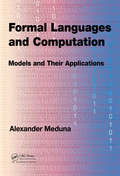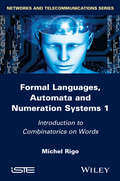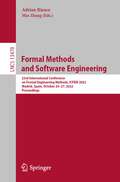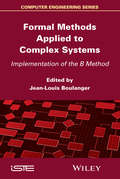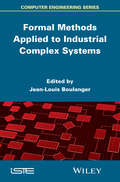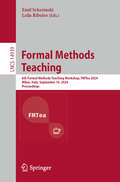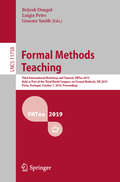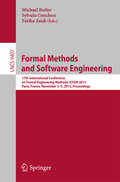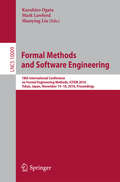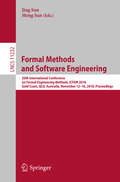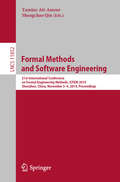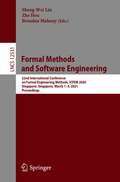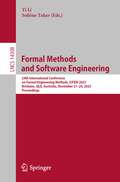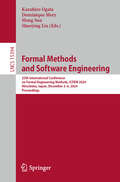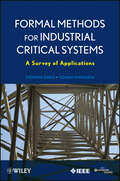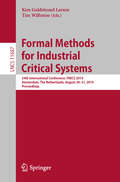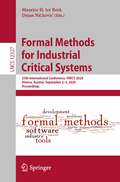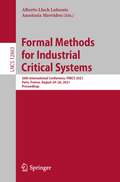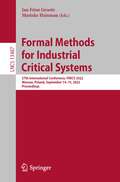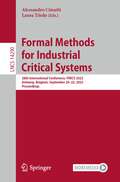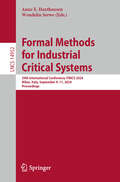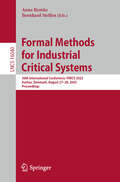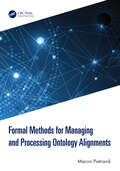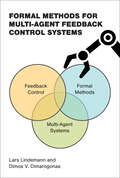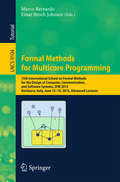- Table View
- List View
Formal Languages and Computation: Models and Their Applications
by Alexander MedunaFormal Languages and Computation: Models and Their Applications gives a clear, comprehensive introduction to formal language theory and its applications in computer science. It covers all rudimental topics concerning formal languages and their models, especially grammars and automata, and sketches the basic ideas underlying the theory of computatio
Formal Languages, Automata and Numeration Systems 1: Introduction to Combinatorics on Words
by Michel RigoFormal Languages, Automaton and Numeration Systems presents readers with a review of research related to formal language theory, combinatorics on words or numeration systems, such as Words, DLT (Developments in Language Theory), ICALP, MFCS (Mathematical Foundation of Computer Science), Mons Theoretical Computer Science Days, Numeration, CANT (Combinatorics, Automata and Number Theory). Combinatorics on words deals with problems that can be stated in a non-commutative monoid, such as subword complexity of finite or infinite words, construction and properties of infinite words, unavoidable regularities or patterns. When considering some numeration systems, any integer can be represented as a finite word over an alphabet of digits. This simple observation leads to the study of the relationship between the arithmetical properties of the integers and the syntactical properties of the corresponding representations. One of the most profound results in this direction is given by the celebrated theorem by Cobham. Surprisingly, a recent extension of this result to complex numbers led to the famous Four Exponentials Conjecture. This is just one example of the fruitful relationship between formal language theory (including the theory of automata) and number theory.
Formal Methods and Software Engineering: 23rd International Conference on Formal Engineering Methods, ICFEM 2022, Madrid, Spain, October 24–27, 2022, Proceedings (Lecture Notes in Computer Science #13478)
by Min Zhang Adrian RiescoThis book constitutes the proceedings of the 23rd International Conference on Formal Engineering Methods, ICFEM 2022, held in Madrid, Spain, in October 2022. The 16 full and 4 short papers presented together with 1 doctoral symposium paper in this volume were carefully reviewed and selected from 41 submissions. The papers cover for research in all areas related to formal engineering methods, such as verification and validation, software engineering, formal specification and modeling, software security, and software reliability.
Formal Methods Applied to Complex Systems: Implementation of the B Method (Wiley-iste Ser.)
by Jean-Louis BoulangerThis book presents real-world examples of formal techniques in an industrial context. It covers formal methods such as SCADE and/or the B Method, in various fields such as railways, aeronautics, and the automotive industry. The purpose of this book is to present a summary of experience on the use of “formal methods” (based on formal techniques such as proof, abstract interpretation and model-checking) in industrial examples of complex systems, based on the experience of people currently involved in the creation and assessment of safety critical system software. The involvement of people from within the industry allows the authors to avoid the usual confidentiality problems which can arise and thus enables them to supply new useful information (photos, architecture plans, real examples, etc.).
Formal Methods Applied to Industrial Complex Systems: Implementation Of The B Method
by Jean-Louis BoulangerA presentation of real examples of industrial uses for formal methods such as SCADE, the B-Method, ControlBuild, Matelo, etc. in various fields, such as railways, aeronautics, and the automotive industry, the purpose of this book is to present a summary of experience on the use of these “formal methods” (such as proof and model-checking) in industrial examples of complex systems. It is based on the experience of people who are currently involved in the creation and evaluation of safety critical system software. The involvement of people from within the industry allows us to avoid the usual problems of confidentiality which could arise and thus enables us to supply new useful information (photos, architecture plans, real examples, etc.).
Formal Methods Teaching: 6th Formal Methods Teaching Workshop, FMTea 2024, Milan, Italy, September 10, 2024, Proceedings (Lecture Notes in Computer Science #14939)
by Leila Ribeiro Emil SekerinskiThis book constitutes the proceedings of the 6th International Workshop on Formal Methods Teaching, FMTea 2024, which was held in Milan, Italy, on September 10, 2024. The 7 full papers included in these proceedings were carefully reviewed and selected from 9 submissions. The book also contains one invited talk in full paper length. The papers focus on learning formal methods for the purpose of teaching and self-learning.
Formal Methods Teaching: Third International Workshop and Tutorial, FMTea 2019, Held as Part of the Third World Congress on Formal Methods, FM 2019, Porto, Portugal, October 7, 2019, Proceedings (Lecture Notes in Computer Science #11758)
by Graeme Smith Brijesh Dongol Luigia PetreThis book constitutes the refereed proceedings of the Third International Workshop and Tutorial, FMTea 2019, Held as Part of the Third World Congress on Formal Methods, FM 2019, Porto, Portugal, October 2019. The 14 full papers presented together with 3 abstract papers were carefully reviewed and selected from 22 submissions. The papers are organized in topical sections named: Tutorial lectures; Teaching Program Verification; Teaching Program Development; and Effective Teaching Techniques.
Formal Methods and Software Engineering
by Michael Butler Sylvain Conchon Fatiha ZaïdiThis book constitutes the refereed proceedings of the 17th International Conference on Formal Engineering Methods, ICFEM 2015, held in Paris, France, in November 2015. The 27 revised full papers presented were carefully reviewed and selected from 82 submissions. The papers cover a wide range of topics in the area of formal methods and software engineering and are devoted to advancing the state of the art of applying formal methods in practice. They focus in particular on combinations of conceptual and methodological aspects with their formal foundation and tool support.
Formal Methods and Software Engineering
by Shaoying Liu Kazuhiro Ogata Mark LawfordThis book constitutes the refereed proceedings of the 18th International Conference on Formal Engineering Methods, ICFEM 2016, held in Tokyo, Japan, in November 2016. The 27 revised full papers presented together with three invited talks were carefully reviewed and selected from 64 submissions. The conference focuses in all areas related to formal engineering meth-ods, such as verification and validation, software engineering, formal specification and modeling, software security, and software reliability.
Formal Methods and Software Engineering: 20th International Conference on Formal Engineering Methods, ICFEM 2018, Gold Coast, QLD, Australia, November 12-16, 2018, Proceedings (Lecture Notes in Computer Science #11232)
by Jing Sun Meng SunThis book constitutes the refereed proceedings of the 20th International Conference on Formal Engineering Methods, ICFEM 2018, held in Gold Coast, QLD, Australia, in November 2018. The 22 revised full papers presented together with 14 short papers were carefully reviewed and selected from 66 submissions. The conference focuses on all areas related to formal engineering methods, such as verification; network systems; type theory; theorem proving; logic and semantics; refinement and transition systems; and emerging applications of formal methods.
Formal Methods and Software Engineering: 21st International Conference on Formal Engineering Methods, ICFEM 2019, Shenzhen, China, November 5–9, 2019, Proceedings (Lecture Notes in Computer Science #11852)
by Yamine Ait-Ameur Shengchao QinThis book constitutes the proceedings of the 21st International Conference on Formal Engineering Methods, ICFEM 2019, held in Shenzhen, China, in November 2019. The 28 full and 8 short papers presented in this volume were carefully reviewed and selected from 94 submissions. They deal with the recent progress in the use and development of formal engineering methods for software and system design and record the latest development in formal engineering methods.
Formal Methods and Software Engineering: 22nd International Conference on Formal Engineering Methods, ICFEM 2020, Singapore, Singapore, March 1–3, 2021, Proceedings (Lecture Notes in Computer Science #12531)
by Shang-Wei Lin Zhe Hou Brendan MahoneyThis book constitutes the proceedings of the 22nd International Conference on Formal Engineering Methods, ICFEM 2020, held in Singapore, Singapore, in March 2021. The 16 full and 4 short papers presented together with 1 doctoral symposium paper in this volume were carefully reviewed and selected from 41 submissions. The papers cover theory and applications in formal engineering methods together with case studies. They also represent the recent development in the use and development of formal engineering methods for software and system development.
Formal Methods and Software Engineering: 24th International Conference on Formal Engineering Methods, ICFEM 2023, Brisbane, QLD, Australia, November 21–24, 2023, Proceedings (Lecture Notes in Computer Science #14308)
by Yi Li Sofiène TaharThis book constitutes the proceedings of the 24th International Conference on Formal Methods and Software Engineering, ICFEM 2023, held in Brisbane, QLD, Australia, during November 21–24, 2023.The 13 full papers presented together with 8 doctoral symposium papers in this volume were carefully reviewed and selected from 34 submissions, the volume also contains one invited paper. The conference focuses on applying formal methods to practical applications and presents papers for research in all areas related to formal engineering methods.
Formal Methods and Software Engineering: 25th International Conference on Formal Engineering Methods, ICFEM 2024, Hiroshima, Japan, December 2–6, 2024, Proceedings (Lecture Notes in Computer Science #15394)
by Shaoying Liu Kazuhiro Ogata Dominique Mery Meng SunThis volume LNCS 15394 constitutes the refereed proceedings of 25th International Conference on Formal Engineering Methods, ICFEM 2024, in Hiroshima, Japan, in December 2024. The 22 full papers presented were carefully reviewed and selected from 50 submissions. The conference focuses on wide range of research areas, covering both theoretical foundations and practical applications of formal engineering methods
Formal Methods for Industrial Critical Systems
by Stefania Gnesi Tiziana MargariaToday, formal methods are widely recognized as an essential step in the design process of industrial safety-critical systems. In its more general definition, the term formal methods encompasses all notations having a precise mathematical semantics, together with their associated analysis methods, that allow description and reasoning about the behavior of a system in a formal manner. Growing out of more than a decade of award-winning collaborative work within the European Research Consortium for Informatics and Mathematics, Formal Methods for Industrial Critical Systems: A Survey of Applications presents a number of mainstream formal methods currently used for designing industrial critical systems, with a focus on model checking. The purpose of the book is threefold: to reduce the effort required to learn formal methods, which has been a major drawback for their industrial dissemination; to help designers to adopt the formal methods which are most appropriate for their systems; and to offer a panel of state-of-the-art techniques and tools for analyzing critical systems.
Formal Methods for Industrial Critical Systems: 24th International Conference, FMICS 2019, Amsterdam, The Netherlands, August 30–31, 2019, Proceedings (Lecture Notes in Computer Science #11687)
by Kim Guldstrand Larsen Tim WillemseThis book constitutes the proceedings of the 24th International Conference on Formal Methods for Industrial Critical Systems, FMICS 2019, held in Amsterdam, The Netherlands, in August 2019. The 9 regular papers presented in this volume were carefully reviewed and selected from 15 submissions. The conference also featured invited talks by Jaco van de Pol (Aarhus University, and Twente University), jointly with CONCUR, and Holger Hermanns (Universität des Saarlandes) and a special session on (commercial) formal methods in industry. The aim of the FMICS conference series is to provide a forum for researchers who are interested in the development and application of formal methods in industry. In particular, FMICS brings together scientists and engineers who are active in the area of formal methods and interested in exchanging their experiences in the industrial usage of these methods. The FMICS conference series also strives to promote research and development for the improvement of formal methods and tools for industrial applications.
Formal Methods for Industrial Critical Systems: 25th International Conference, FMICS 2020, Vienna, Austria, September 2–3, 2020, Proceedings (Lecture Notes in Computer Science #12327)
by Maurice H. ter Beek Dejan NičkovićThis book constitutes the proceedings of the 25th International Workshop on Formal Methods for Industrial Critical Systems, FMICS 2020, which was held during September 2-3, 2020. The conference was planned to take place in Vienna, Austria. Due to the COVID-19 pandemic it changed to a virtual event.The 11 full papers presented in this volume were carefully reviewed and selected from 26 submissions. The papers are organized in topical sections as follows: Quantitative Analysis and Cyber-Physical Systems, Formal Verification of Industrial Systems, Temporal Logic and Model Checking. The book also contains a lengthy report on a Formal Methods Survey conducted on occasion of the 25th edition of the conference.
Formal Methods for Industrial Critical Systems: 26th International Conference, FMICS 2021, Paris, France, August 24–26, 2021, Proceedings (Lecture Notes in Computer Science #12863)
by Alberto Lluch Lafuente Anastasia MavridouThis book constitutes the proceedings of the 26th International Workshop on Formal Methods for Industrial Critical Systems, FMICS 2021, which was held during August 24-26, 2021. The conference was planned to take place in Pairs, France. Due to the COVID-19 pandemic it changed to a virtual event. The 10 full papers and 6 short papers presented in this volume were carefully reviewed and selected from 31 submissions. The papers are organized in topical sections as follows: Verification, Program Safety and Education, (Event-)B Modeling and Validation, Formal Analysis, Tools, Test Generation and Probabilistic Verification.
Formal Methods for Industrial Critical Systems: 27th International Conference, FMICS 2022, Warsaw, Poland, September 14–15, 2022, Proceedings (Lecture Notes in Computer Science #13487)
by Marieke Huisman Jan Friso GrooteThis book constitutes the proceedings of the 27th International Conference on Formal Methods for Industrial Critical Systems, FMICS 2022, which took place in Warsaw, Poland, in September 2022. The 13 full papers included in this book were carefully reviewed and selected from 22 submissions. They were organized in topical sections as follows: Certification; industrial use cases; testing and monitoring; and methodology.
Formal Methods for Industrial Critical Systems: 28th International Conference, FMICS 2023, Antwerp, Belgium, September 20–22, 2023, Proceedings (Lecture Notes in Computer Science #14290)
by Alessandro Cimatti Laura TitoloThis book constitutes the proceedings of the 28th International Conference on Formal Methods for Industrial Critical Systems, FMICS 2023, held in Antwerp, Belgium, during September 20–22, 2023. The 14 full papers included in this book were carefully reviewed and selected from 24 submissions. The papers focus on development and application of formal methods in industry. FMICS is a platform for scientists and engineers who are active in the area of formal methods and interested in exchanging their experiences in the industrial usage of these methods. FMICS also strives to promote research and development for the improvement of formal methods and tools for industrial applications.
Formal Methods for Industrial Critical Systems: 29th International Conference, FMICS 2024, Milan, Italy, September 9–11, 2024, Proceedings (Lecture Notes in Computer Science #14952)
by Anne E. Haxthausen Wendelin SerweThis book constitutes the proceedings of the 29th International Conference on Formal Methods for Industrial Critical Systems, FMICS 2024, held in Milan, Italy, during September 9–13, 2024. The 14 full papers included in this book were carefully reviewed and selected from 22 submissions. These papers have been organized in the following topical sections: Real-Time Systems/ Robotics; Semantics and Verification; Case Studies; Neural Networks.
Formal Methods for Industrial Critical Systems: 30th International Conference, FMICS 2025, Aarhus, Denmark, August 27–28, 2025, Proceedings (Lecture Notes in Computer Science #16040)
by Anne Remke Bernhard SteffenThis book constitutes the proceedings of the 30th International Conference on Formal Methods for Industrial Critical Systems, FMICS 2025, held in Aarhus, Denmark, during August 27–28, 2025.The 13 full papers included in this book together with 2 invited papers were carefully reviewed and selected from 25 submissions. The papers have been organized in the following topical sections: verification; automotive and railway; cyber-physical systems; and embedded systems
Formal Methods for Managing and Processing Ontology Alignments
by Marcin PietranikOntologies are formal knowledge representation methods that can provide means for a shared understanding of a given domain. To enable meaningful communication and interoperability between two or more information systems that utilize independently created ontologies, a bridge between them is necessary, often referred to as an ontology alignment. Formal Methods for Managing and Processing Ontology Alignments provides complete ontology alignment lifecycle, including modelling, methods, and maintenance processes.Summarizing the author's research from the past ten years, this book consolidates findings previously published in prestigious international journals and presented at leading conferences. Each chapter is designed to be self-contained, allowing readers to approach the material modularly. The text introduces basic mathematical concepts, and later chapters build upon these foundations, but each focuses on specific aspects of ontology alignment, making the content accessible and easy to follow. Key Features Includes formal definitions of ontologies and ontology alignment along with a set of methods for providing semantics of attributes and relations. Provides application of fuzzy logic in the task of ontology alignment. Contains methods of managing the evolution of ontologies and their alignments. Proposes novel methods of assessing the quality ontology alignment. Situated in the fields of knowledge representation and semantic technologies, this book is an invaluable resource for both academic researchers and practitioners, as well as students looking to deepen their understanding.
Formal Methods for Multi-Agent Feedback Control Systems (Cyber Physical Systems Series)
by Lars Lindemann Dimos V. DimarogonasAn introduction to formal methods for feedback control of multi-agent systems with safety and performance guarantees.Multi-agent control systems can accomplish tasks that single-agent systems cannot address, such as aerial surveillance of large areas by a group of drones. In Formal Methods for Multi-Agent Feedback Control Systems, Lars Lindemann and Dimos Dimarogonas provide an accessible introduction to formal methods for feedback control of multi-agent systems. Their book is the first to bridge the gap between formal methods and feedback control for the scalable design of cyber-physical systems. The material covered is intended for scientists, engineers, and students, and no background in formal methods or control theory is required. The authors also highlight future research directions for those working at the intersection of formal methods and control.In control theory, the goal is to design feedback control laws for dynamical systems that achieve control objectives such as stability or forward invariance of sets. Formal methods, on the other hand, provide verification and design techniques for more complex system specifications using temporal logics. However, their high computational cost limits scaling beyond a small number of agents. Besides scalability, another central challenge is to achieve robustness in the system design. Thus, the authors focus on the design of scalable and robust feedback control algorithms for multi-agent control systems under temporal logic specifications.
Formal Methods for Multicore Programming
by Marco Bernardo Einar Broch JohnsenThis book presents 5 tutorial lectures given by leading researchers at the 15th edition of the International School on Formal Methods for the Design of Computer, Communication and Software Systems, SFM 2015, held in Bertinoro, Italy, in June 2015. SFM 2015 was devoted to multicore programming and covered topics such as concurrency and coordination mechanisms, architecture and memory models and type systems.
